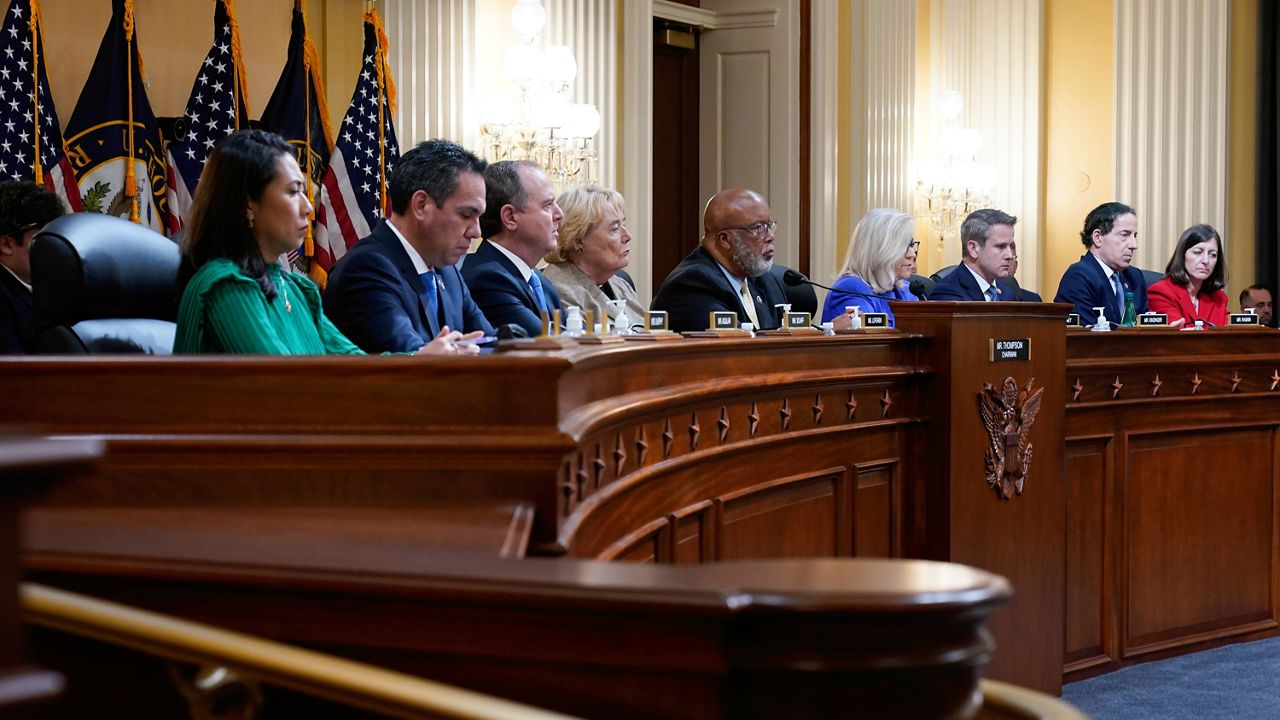The House Select Committee investigating the Jan. 6 riot at the U.S. Capitol has postponed its next hearing, scheduled for Wednesday, June 15, the panel announced Tuesday.
In its initial release, the committee did not give a reason for the delay. Illinois Rep. Adam Kinzinger, one of two Republicans on the panel, wrote that the hearing will be moved to next week.
"Just to be clear: tomorrow’s hearing has been moved to next week," Kinzinger wrote on Twitter. "This change was made to space out the #January6thHearings; nothing else. I look forward to leading this hearing and presenting our findings to the American people."
Earlier Tuesday, California Rep. Zoe Lofgren, a member of the panel, said that the delay was due to technical issues related to the panel's video team, which has put together a number of video exhibits played during the first two hearings.
"I think we're just firming up – there's no big deal," Rep. Lofgren said on MSNBC's "Morning Joe" on Tuesday. "But I'll tell you, putting together the video and exhibits is an exhausting exercise for our very small video staff. So we're trying to – you know, we were going to have one, two three in one week, and it's just too much to put it all together."
"So we're trying to give them a little room to do their technical work is mainly it," Lofgren added.
Wednesday's hearing was set to feature testimony from Trump-era Justice Department officials: Jeffrey Rosen, the former acting attorney general during the Jan. 6 riot, Richard Donoghue and Steven Engel.
The officials were expected to testify about a Jan. 3, 2021 White House meeting in which then-President Donald Trump weighed whether to replace Rosen with Jeffrey Clark, a lower-ranking official who had expressed a willingness to champion his bogus claims of voting fraud. Trump abandoned the idea when multiple Justice Department and White House lawyers told him that they would resign if that happened.
The committee's next hearing is scheduled for Thursday, June 16.
Monday's hearing was focused largely on highlighting — and debunking — former President Trump’s false claims of voter fraud in the 2020 presidential election.
“President Trump rejected the advice of his campaign experts on election night, and instead followed the course recommended by an apparently inebriated Rudy Giuliani to just claim he won and insist the vote-counting stop, to falsely claim everything was fraudulent,” Rep. Liz Cheney, the panel’s vice chair, said at Monday’s hearing.
“He falsely told the American people the election was not legitimate,” she added of Trump. “In his words, quote, ‘a major fraud.’ Millions of Americans believed him.”
Monday’s hearing featured video testimony of Trump’s closest advisers — including his own daughter, Ivanka Trump, and his son-in-law, Jared Kushner — urging the former president to reject “completely bogus” voter fraud claims.
The hearing also made the case that the former president and his allies used those false voter claims to raise millions of dollars ahead of the Capitol attack. Lofgren said Monday that panel aimed to prove that the former president's campaign "used these false claims of election fraud to raise hundreds of millions of dollars from supporters who were told their donations were for the legal fight in the courts."
"But the Trump Campaign didn't use the money for that," she continued. "The 'Big Lie' was also a big rip-off."
An investigator working for the House committee said in a video presentation played Monday that the Trump campaign sent “millions” of fundraising emails to supporters related to false claims about the election and raised hundreds of millions of dollars by urging people to donate to a nonexistent “election defense fund.”
The campaign raised $100 million in the first week after the election, said senior investigative counsel Amanda Wick, and $250 million total before Jan. 6. The campaign sometimes sent as many as 25 emails per day, she said.
And the majority of the funds raised in those days after the election went to a political action committee (PAC) called Save America created by the president on Nov. 9, 2020, not to a fund to exclusively fight voter fraud as implied in the emails, Wick said.
The PAC instead “made millions of dollars of contributions to pro-Trump organizations,” Wick said the committee found, including $1 million to former chief of staff Mark Meadows’ charitable foundation, more than $200,000 to the Trump Hotel Collection, and over $5 million to Event Strategies Inc., which put together the rally on January 6.
“The evidence developed by the select committee highlights how the Trump campaign aggressively pushed false election claims to fundraise, telling supporters it would be used to fight voter fraud that did not exist,” Wick said.
Rep. Zoe Lofgren said small dollar donors who supported the Trump campaign at the time were misled into thinking their money would somehow help the former president win the election.
“Those donors deserve the truth about what those funds will be used for,” Rep. Lofgren said.
“We found evidence that the Trump campaign and its surrogates misled donors as to where their funds would go and what they would be used for,” she added.
Following Monday's hearing, Lofgren told CNN's Jake Tapper that former Fox News host Kimberly Guilfoyle, the fiance of Trump's son Donald Trump Jr., was paid $60,000 for her roughly two-minute speech at the Ellipse on Jan. 6.
"It’s a grift,” Lofgren said.
The Associated Press contributed to this report.



